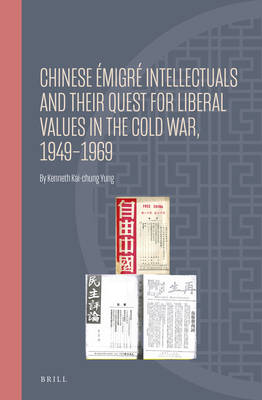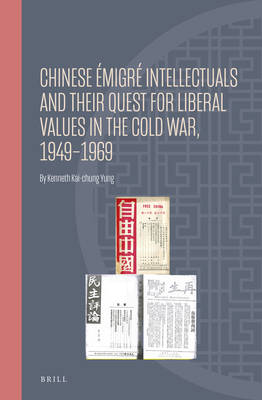
- Afhalen na 1 uur in een winkel met voorraad
- Gratis thuislevering in België vanaf € 30
- Ruim aanbod met 7 miljoen producten
- Afhalen na 1 uur in een winkel met voorraad
- Gratis thuislevering in België vanaf € 30
- Ruim aanbod met 7 miljoen producten
Zoeken
Chinese Émigré Intellectuals and Their Quest for Liberal Values in the Cold War, 1949-1969
Kenneth Kai-Chung Yung
€ 242,95
+ 485 punten
Omschrijving
By examining the life and thought of self-exiled Chinese intellectuals after 1949 by placing them in the context of the global Cold War, Kenneth Kai-chung Yung argues that Chinese intellectuals living in Hong Kong, Taiwan and overseas Chinese communities in the 1950s could not escape from the global anti-utopian Cold War currents. Each of them responded to such currents quite differently. Yung also examines different models of nation-building advocated by the émigré intellectuals and argues in his book that these émigré intellectuals inherited directly the multifaceted Chinese liberal tradition that was well developed in the Republican era (1911-1949). Contrary to existing literature that focus mostly on the New Confucians or the liberals, this study highlights that moderate socialists cannot be ignored as an important group of Chinese émigré intellectuals in the first two decades of the Cold War era. This book will inspire readers who are concerned about the prospects for democracy in contemporary China by painting a picture of the Chinese self-exiles' experiences in the 1950s and 1960s.
Specificaties
Betrokkenen
- Auteur(s):
- Uitgeverij:
Inhoud
- Aantal bladzijden:
- 254
- Taal:
- Engels
- Reeks:
- Reeksnummer:
- nr. 25
Eigenschappen
- Productcode (EAN):
- 9789004466036
- Verschijningsdatum:
- 14/10/2021
- Uitvoering:
- Hardcover
- Formaat:
- Genaaid
- Afmetingen:
- 155 mm x 235 mm
- Gewicht:
- 550 g

Alleen bij Standaard Boekhandel
+ 485 punten op je klantenkaart van Standaard Boekhandel
Beoordelingen
We publiceren alleen reviews die voldoen aan de voorwaarden voor reviews. Bekijk onze voorwaarden voor reviews.








